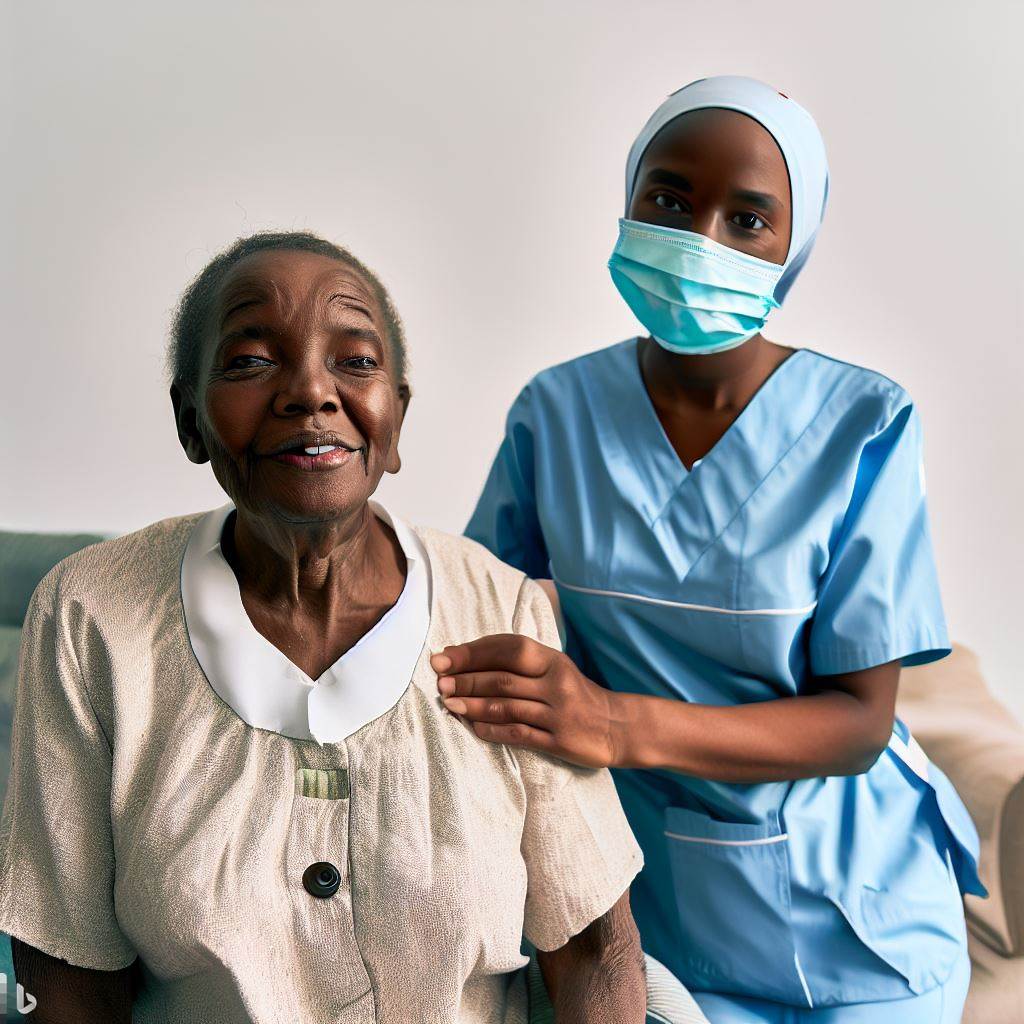Introduction
Massage therapy plays a significant role in Nigeria, offering relaxation, stress relief, and healing for many people.
In this blog post, we will delve into the captivating journey of a massage therapist and discover the stories that unfold in Nigeria.
The Significance of Massage Therapy in Nigeria
Massage therapy has become an essential part of Nigerian culture, providing physical and mental rejuvenation.
It is a time-honored practice that has been passed down through generations, valued for its healing benefits.
Imagine stepping into a serene oasis, where the gentle touch of a skilled practitioner melts away your worries and tensions.
The journey of a massage therapist in Nigeria is filled with fascinating tales of transformation and healing.
From the bustling streets of Lagos to the tranquil villages of the Niger Delta, massage therapists traverse the diverse landscapes of Nigeria, offering their healing touch to those in need.
Their hands possess the power to relieve pain, dissolve stress, and restore balance.
Each day brings new challenges and triumphs as these therapists embark on their mission to bring wellness and tranquility to Nigerians.
They encounter clients from all walks of life – from weary travelers seeking respite to athletes in need of muscle recovery. Each session holds the potential to change lives, one touch at a time.
As we dive deeper into the journey of a massage therapist in Nigeria, we will discover the personal stories behind their chosen path.
We will uncover the motivations, struggles, and triumphs that shape their craft, giving us a unique insight into this ancient art form.
So, come along and join us in exploring the incredible world of massage therapy in Nigeria. Get ready to be captivated by the tales of healing, relaxation, and transformation that unfold on this enchanting journey.
Background of Massage Therapy in Nigeria
Explore the background of massage therapy in Nigeria, including its history, cultural practices, and importance:
- Rich history dating back centuries as a form of healing and relaxation.
- Diverse ethnic groups with unique massage techniques passed down through generations.
- Significant role in physical and mental health, serving as a natural therapy.
- Ancient healers relied on massage for treating diseases and restoring balance.
- Used for relaxation and stress relief, promoting physical and mental rejuvenation.
- Incorporated into rituals and ceremonies for body cleansing and spiritual well-being.
- Utilization of various tools and techniques, such as herbs and hot stones.
- Recognized as an alternative medicine practice, complementing conventional treatments.
- Increasing demand in urban centers to alleviate the effects of stressful lifestyles.
- Rapid growth of the massage therapy industry, meeting rising demand.
- Emphasis on professional training and certification programs for high-quality services.
- Benefits include improved circulation, stress reduction, and muscle tension relief.
- Attracts tourists seeking authentic cultural experiences and traditional treatments.
- Supporting local therapists preserves traditions and boosts the industry’s growth.
Basically, massage therapy in Nigeria has a profound history, cultural significance, and positive impact on health and well-being.
Read: Massage Therapy Schools and Certifications in Nigeria
Qualities and Skills of a Massage Therapist in Nigeria
When it comes to being a successful massage therapist in Nigeria, specific skills and qualities are crucial.
Let’s explore the necessary attributes that contribute to their journey.
- Empathy: Having empathy is essential as it allows a massage therapist to connect with their clients on a deeper level, understanding their needs and concerns.
- Intuition: Developing an intuitive sense helps massage therapists in Nigeria understand the areas of the body that require attention or specific techniques to achieve optimal results.
- Cultural Sensitivity: In a diverse country like Nigeria, cultural sensitivity is of utmost importance. Being aware and respectful of different cultural practices and beliefs enhances the therapist-client relationship.
- Communication: A massage therapist should possess excellent communication skills to effectively understand the client’s preferences, explain procedures, and address any concerns throughout the session.
- Time Management: Being able to manage time efficiently ensures that the therapist can provide adequate attention and care to each client, maintaining a smooth workflow in their practice.
- Physical Stamina: Massage therapy requires physical strength and stamina. Therapists in Nigeria should be able to perform treatments for extended periods without compromising their own well-being.
- Knowledge of Massage Techniques: A massage therapist should be well-versed in various massage techniques to cater to the specific needs of their clients, such as Swedish, deep tissue, or hot stone massage.
- Continuous Learning: Learning is a lifelong process, and successful massage therapists in Nigeria understand the importance of staying updated with new techniques, research, and industry trends.
- Professionalism: Maintaining a professional demeanor is crucial for massage therapists. This includes proper attire, maintaining confidentiality, and respecting the client’s boundaries.
- Adaptability and Flexibility: Nigeria’s massage therapists should be adaptable to different client demands and flexible in adjusting their techniques to accommodate individual needs and preferences.
How These Skills and Qualities Contribute to the Therapist’s Journey
The possession of these skills and qualities elevates the journey of a massage therapist in Nigeria in various ways:
- Enhanced client satisfaction: Empathy, intuition, and cultural sensitivity create a comfortable and trust-based environment that fosters client satisfaction.
- Word-of-mouth referrals: Exceptional communication skills, professionalism, and time management lead to positive client experiences and potential referrals.
- Improved client outcomes: A thorough understanding of massage techniques and continuous learning allows therapists to provide effective treatments and address specific client concerns.
- Professional growth: By continuously learning and adapting to industry advancements, massage therapists can expand their knowledge and skills, thus advancing their career prospects.
- Diversified clientele: Cultural sensitivity and adaptability enable therapists in Nigeria to attract clients from various backgrounds, fostering a diverse client base.
Essentially, being a successful massage therapist in Nigeria requires a combination of technical expertise and personal qualities.
Empathy, intuition, cultural sensitivity, and effective communication contribute to client satisfaction and word-of-mouth referrals.
Continuous learning, professionalism, adaptability, and physical stamina are vital for professional growth and success.
Mastering these skills and qualities enriches the therapist’s journey, providing opportunities for personal and career development.
Read: Exploring the Spa and Wellness Industry in Nigeria
Educational and Training Pathway
Massage therapy is a rapidly growing profession in Nigeria, and becoming a massage therapist requires a specific educational and training pathway.
Here are the steps and requirements to pursue a career in this field:
Educational Requirements
- Completion of secondary education or its equivalent is the first step towards becoming a massage therapist in Nigeria.
- While a specific academic background is not mandatory, a strong foundation in science subjects such as biology can be advantageous.
- Many massage therapy schools and programs in Nigeria require applicants to have a minimum of five credits in subjects including English, Mathematics, Biology, and two other relevant subjects.
Training Requirements
- After meeting the educational prerequisites, aspiring massage therapists must enroll in a recognized massage therapy training program.
- These programs are typically offered by vocational schools, technical institutes, or specialized massage therapy schools.
- The duration of the training program can vary, but it generally ranges from six months to two years.
- During the training, students receive comprehensive instruction on various massage techniques, anatomy, physiology, pathology, ethics, and business practices.
- Training programs also include clinical practice, giving students the opportunity to apply their knowledge and acquire hands-on experience.
Certification Process and Licensing Requirements
- Upon successful completion of the training program, aspiring massage therapists are eligible to seek certification from recognized certifying bodies such as the Massage Therapists Association of Nigeria (MTAN).
- To obtain certification, candidates must pass the certification exam, which evaluates their theoretical knowledge and practical skills.
- Certification is not legally required to practice as a massage therapist in Nigeria, but it enhances professional credibility and job prospects.
- While there is no specific licensing requirement for massage therapists in Nigeria, some states may have their own regulations and guidelines.
- It is essential for massage therapists to familiarize themselves with any local licensing requirements or regulations in the area they plan to practice.
Specialized Training Programs
- In addition to the general massage therapy training programs, Nigeria also offers specialized training programs in specific massage modalities.
- These programs allow massage therapists to further enhance their skills and offer specialized services to clients.
- Popular specialized training programs in Nigeria include sports massage, prenatal massage, deep tissue massage, and aromatherapy.
- These programs usually require additional training hours beyond the basic massage therapy training.
- Obtaining specialized training can open up opportunities for massage therapists to work in specialized settings and cater to specific client needs.
By completing the educational and training pathway, aspiring massage therapists in Nigeria can establish themselves in this rewarding profession, contribute to the well-being of clients, and enjoy a successful career.
Read: The Role of a Massage Therapist in Nigerian Healthcare

Explore Further: Breaking Down the Salary of Nutritionists in Nigeria
Experiences and Challenges Faced by Massage Therapists in Nigeria
Being a massage therapist in Nigeria comes with its own set of unique experiences and challenges.
Let’s delve into some stories and shed light on the obstacles they face in their profession, including cultural and societal factors.
Cultural Appreciation
- A massage therapist in Nigeria must have a deep understanding and appreciation for the diverse cultures and traditions across the country.
- They often encounter clients from different ethnic backgrounds, each with their own unique cultural preferences and expectations.
- Being sensitive to these cultural differences is crucial to providing a satisfying massage experience.
Limited Recognition
- In Nigeria, massage therapy is not always recognized as a legitimate profession or healthcare service.
- Massage therapists sometimes struggle to gain recognition and acceptance from both society and the medical community.
- Overcoming this challenge requires constant education and demonstration of the real benefits of massage therapy.
Lack of Regulation
- Unlike in some countries, there is a lack of proper regulation and licensing for massage therapists in Nigeria.
- This absence of regulation opens the door for unqualified individuals to offer massage services, tarnishing the reputation of the profession.
- Efforts need to be made to establish standardized requirements and regulations to protect both therapists and clients.
Financial Constraints
- Massage therapists often face financial challenges, especially when starting their own practice or working independently.
- The costs associated with equipment, training, and ongoing professional development can be overwhelming.
- The lack of healthcare coverage for massage therapy further limits the earning potential of therapists.
Stigma and Misconceptions
- There is a prevalent stigma surrounding massage therapy in Nigeria, with misconceptions about its association with illicit activities.
- Massage therapists constantly battle against these misconceptions and work hard to establish trust and credibility.
- Building a strong professional network and educating the public are essential steps to eliminate this stigma.
Physical and Emotional Strain
- The physical demands of providing massages can take a toll on the therapist’s body, leading to musculoskeletal issues.
- Additionally, the emotional strain of dealing with clients’ pain, stress, and trauma can be challenging.
- Self-care, regular exercise, and seeking support from peers are vital for the well-being of massage therapists.
Ethical Considerations
- Massage therapists in Nigeria face ethical dilemmas, such as maintaining client confidentiality and boundaries.
- Respecting cultural and religious sensitivities, while also providing effective therapy, requires a delicate balance.
- Continuous training and adherence to a code of ethics help therapists navigate these challenging situations.
Professional Development Opportunities
- Access to professional development opportunities, such as advanced trainings and conferences, is limited in Nigeria.
- Massage therapists often struggle to expand their knowledge and skills due to the lack of available resources.
- Efforts to enhance educational opportunities for therapists would contribute to the growth of the profession.
Despite the challenges, Nigerian massage therapists are resilient in their pursuit of promoting wellness and providing healing touch to their clients.
They continue to overcome cultural barriers, raise awareness about the benefits of massage therapy, and strive for professional recognition in their beloved country.
Read: Top Nursing Schools: A Comprehensive Guide for Nigerians
The Impact of Massage Therapy on Individuals and Communities in Nigeria
Massage therapy has become increasingly popular in Nigeria, emerging as an effective practice to promote relaxation, relieve stress, and improve overall well-being.
In this section, we will explore the positive effects and benefits of massage therapy on individuals and how it contributes to the health and welfare of communities in Nigeria.
The Positive Effects and Benefits of Massage Therapy on Individuals
Massage therapy offers numerous positive effects on individuals, both physical and mental. Let’s take a look at some of the benefits:
- Increase in blood circulation, promoting the delivery of nutrients and oxygen throughout the body.
- Reduction in muscle tension, alleviating pain and improving flexibility.
- Release of endorphins, the body’s natural painkillers, leading to improved mood and reduced anxiety.
- Improved sleep patterns, aiding in the prevention of sleep disorders.
- Boost in the immune system, enhancing the body’s ability to fight off illnesses and diseases.
These positive effects of massage therapy have led to its widespread adoption among individuals in Nigeria, seeking to enhance their well-being and quality of life.
Massage Therapy and the Overall Health and Well-being of Communities in Nigeria
Massage therapy not only benefits individuals but also contributes to the overall health and well-being of communities in Nigeria. Here’s how:
- Creation of job opportunities: The rise of massage therapy establishments has provided employment opportunities for trained professionals in communities across Nigeria.
- Improved community mental health: Regular access to massage therapy helps promote stress reduction, leading to improved mental health outcomes for individuals within communities.
- Positive social interactions: Massage therapy establishments serve as meeting points where community members can gather, interact, and foster a sense of belonging.
- Health education and awareness: Massage therapists often educate their clients about the importance of self-care, nutrition, and other wellness-related practices, resulting in increased health awareness within communities.
Success Stories and Testimonials from Clients and Communities
The impact of massage therapy can be exemplified through the success stories and testimonials of clients and communities in Nigeria. Here are a few inspiring examples:
Ada, a client from Lagos, suffered from chronic back pain for years. Regular sessions with a skilled massage therapist not only relieved her pain but also improved her posture and overall well-being.
In the community of Abuja, a massage therapy center opened its doors, providing employment opportunities for locals and creating a hub for community members to come together and enjoy the benefits of massage therapy.
This has had a significant positive effect on the community’s overall sense of unity and well-being.
Ifeoma, a resident of Port Harcourt, struggled with stress and anxiety due to her demanding job.
After integrating massage therapy into her self-care routine, she experienced reduced stress levels, improved mental clarity, and a renewed sense of peace.
These success stories and testimonials demonstrate the transformative impact of massage therapy on individuals and communities, fostering a healthier and more connected society in Nigeria.
In fact, massage therapy plays a vital role in improving the well-being of individuals and communities in Nigeria.
Its positive effects on physical and mental health, along with its contribution to job creation and community development, make it an integral part of the Nigerian healthcare landscape.
As more individuals and communities recognize the benefits, massage therapy continues to redefine the path towards a healthier and happier Nigeria.
Conclusion
The journey of a massage therapist in Nigeria is filled with challenges and rewards. Through hard work and dedication, these therapists have the power to improve the lives of individuals and communities.
Their work is significant as it promotes wellness and healing, both physically and mentally.
By providing relief from pain and stress, massage therapists play a vital role in enhancing the overall quality of life for their clients.
However, their impact goes beyond the individuals they serve. Massage therapy has the potential to contribute to the well-being of entire communities.
By promoting relaxation and reducing tension, massage therapists help create a more peaceful and harmonious environment.
In light of this, it is crucial to recognize and support the work of massage therapists in Nigeria.
Whether through advocacy, education, or simply seeking their services, we all have a role to play in valuing their contributions.
By doing so, we can ensure that massage therapy continues to thrive and make a positive difference in people’s lives.
I invite you, the readers, to reflect on the significance of massage therapy and share your thoughts and experiences. Have you ever benefited from the hands of a skilled massage therapist?
How has it impacted your life or the lives of those around you?
Let’s continue the conversation and celebrate the incredible journey of massage therapists in Nigeria.




